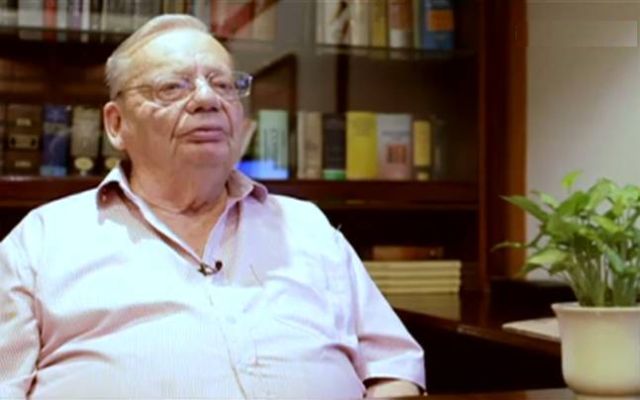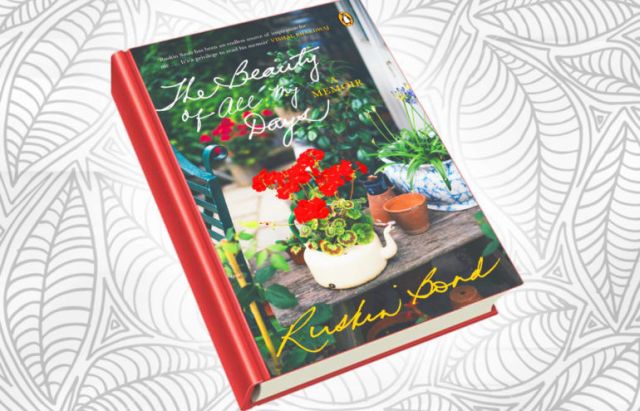
by admin | May 25, 2021 | Interviews

Ruskin Bond
By Sugandha Rawal,
New Delhi : Ruskin Bond feels lucky to live in India. The celebrated author says there is more freedom for writers in India despite various conflicts and occasional turmoil.
“If you think of the world in the present circumstances, how borders change and conflicts are constantly erupting in the world, it is not a peaceful universe as it was before,” Bond told IANS in an email interview when asked about his relationship with the country.
“I find it very lucky to be an Indian and living in India. That is the one reason I am never attracted to going abroad or settling in any other country because in spite of various conflicts and occasional turmoil, compared to other countries, you would find more freedom and topics for a writer in India,” added the author of British descent.
Bond, who was associated with Landmark’s Child Reading to Child initiative for the fourth time this year, continued: “Suppose you were a writer in China and you go and sit to write on Great Wall of China, somebody would come in and take you away…go down the list of various countries, you will find that living in Europe is very dull.”
“If you live in America, you need a gun and I am not very fast with a gun, so I think I would walk out very quickly. So, I think it’s much better here if you compare it to other lands.”
Born in Kasauli in what is now Himachal Pradesh, Bond grew up in Dehradun, New Delhi and Shimla. He then spent four years in London as a young man, only to return to India in 1955. He has been staying at Ivy Cottage in Landour since 1981.
Starting his journey as a writer with his first book at the age of 17, Bond has spent 68 years giving words to his thoughts, creating a collection of over a hundred novellas, short stories, non-fiction and poetry books.
Looking back, Bond said: “I was a bookworm in school and in those days it was easy to get books. Bigger cities had book shops. Also, I had a very lonely childhood so I had turned to books at an early age and they were a great help and by the time I had finished school I had decided that this is what I want to do.”
And he feels he “didn’t do badly”.
“I started wanting to become a well-known writer and today I have lots of readers. It took a long time but it came about. So if you do have a dream, something you want to do very much in your life it will come about if you persist.
“If you keep that vision in mind and the desire within you, you have to work towards it, you just can’t sit back and expect everything to come to you. You have to work towards it as for some people it might come very quickly and for some it may take a lifetime.”
But success can’t come at the cost of quality.
“I see that a lot of people are rushing through. They just want to see their name on the book. The other day, there was a book launch and was self-published by an author and the writer had simple grammatical errors, even the sentences hadn’t been rightly put together. Nobody would ever enjoy reading that book. There was no fluency. So the language is all important to begin with,” said the 84-year-old.
He has spent many years spreading happiness with his stories, and garnered appreciation from all quarters. He is determined to not let age slow him down.
“There will always be books as long as I am mentally capable of it,” said the author, who has been bestowed the Sahitya Akademi Award for English Writing, as well as the Padma Bhushan and the Padma Shri, the country’s third and fourth highest civilian awards.
“I am done and nearly finished with a book on trees, flowers and plants. It’s not a scientific book. I will do another and finish a story of me being a goal keeper. A lot of people think I am a good writer and praise me, but no one praises me for being a goal keeper and in this book I am going to praise myself as a goal keeper. And then what else, I would see how it goes.”
(Sugandha Rawal can be contacted at sugandha.r@ians.in)
—IANS

by admin | May 25, 2021 | Books
 By Saket Suman,
By Saket Suman,
Book: The Beauty of All My Days; Author: Ruskin Bond; Publisher: Penguin; Pages: 183; Price: Rs 499
Life is one epic story and the experiences that each individual has is varied and distinct. Author Ruskin Bond has been penning his life experiences — in both fiction and nonfiction — for well over six decades now and is back with a fresh memoir.
Jacketed in a surreal cover, with colourful flowers calming the reader’s impatient eyes, “The Beauty of All My Days” is dedicated to “all the kind readers and well-wishers who wait patiently outside Mussoorie’s Cambridge Book Depot on Saturday afternoons”. As is customary, India’s grand old author visits the book shop to interact with his readers. “It is a special time for me when I meet and sign their books,” he notes in the dedication section of the just-released book.
The book has 10 chapters and numerous photographs of the writer’s private life, or as Bond describes it, writerly life. But Rusty, as his fans lovingly call him, has penned several similar volumes in the past such as “Lone Fox Dancing” and “Looking For the Rainbow”. Every time you think you know enough about the writer, adored so dearly across the country, there is something new that he throws at you.
And he does it again in “The Beauty of All My Days”.
In the memoir, Bond wonders if his life would have been very different had his parents “not committed the mistakes and indiscretions that shaped their lives and mine and lives of my brother and sister”. Here, those who have read his previous works would recall the not-so-successful marriage of Bond’s parents — Aubrey Bond and Edith Clarke.
So is Bond being repetitive? Perhaps yes, but he adds layers of reflections and shows to the reader that there are different interpretations of human memory, and the human mind sees them differently at different stages of their lives. “Memory improves with age,” he had asserted in a previous book, and the offering at hand shows that the improvement in memory is perhaps a more mature view of the past.
“…had they (his parents) not met, I would not have come into this world, and that would have been a pity because, on the whole, I have had a happy and fulfilling life and have given enjoyment to a few readers, young and old. I’m a person without many regrets…
“I inherited nothing of a material value — not a penny, not a room that I could call my own,” recalls the author who began his literary venture with “A Room on the Roof”, whose protagonist “Rusty” became the life-long synonym for the writer.
“… but I did inherit my father’s intellect and my mother’s sensuality, and possibly the two combined to turn me into a writer,” Bond quips.
Contained in the memoir are tales of finding his own space, of his writing room, picnics and the little things that often go ignored in our fast-paced lives. But perhaps the most significant revelation the book carries is why Bond never writes about politics.
Bond notes that since “everybody else does” he thought he should be the exception and “concentrate instead on birth and death and the interval between”.
“The trouble with political issues is that they come and go very quickly, and if you make them a part of your story it is apt to date the writing. A short story I wrote 60 years ago, about meeting a blind girl on a train (The Eyes Have It / The Eyes Are Not Here / The Girl on the Train), is still read with pleasure by young people today; but if the story had been about meeting a politician who was about to open an eye camp in his constituency, would it have the same impact today?
“The topical is for the day’s news media. The loves of… Romeo and Juliet, or Laila and Majnu, are timeless storytelling,” he writes.
But he also asserts that he hasn’t ignored politics or political issues. “Different governments, different parties in power, different eras. I am fortunate to have witnessed a little history; political history,” he notes, before writing at length on India’s first Prime Minister Jawaharlal Nehru.
He ends the memoir by answering a question he is often asked: “Haven’t you ever thought of living in another country — of settling down somewhere else?”
This is where the tragedies of our time creep into his pages.
“As a boy I had romantic visions of Burma and the road to Mandalay. But it’s a harsh, intolerant land today. And I don’t see myself penning poems in a poppy field in Afghanistan, my intentions would be misunderstood. Further West, into Arabia and the Middle East, there is only death and disaster: Syria, Iraq, Yemen, Libya… When does the suffering end?
“America? I’m no Hemingway, I’m afraid of guns. And he shot himself, didn’t he? South America, up the Amazon? But they’ve cut all the forests away,” laments the 84-year-old writer.
Bond reflects that “Destiny, or the Great Librarian” brought him to Landour’s humble Ivy Cottage where he has lived since 1981.
“Mother Hill near Mother Ganga, and here I have spent my best days and done my best work. And here I stay, until I have written the last word.”
(Saket Suman can be contacted at saket.s@ians.in)
—IANS


